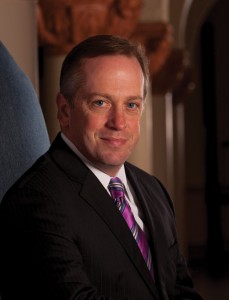 Christopher Pietruszkiewicz, the dean of Stetson University College of Law, has spent much of his career at the intersection of education, business and law. He came to Stetson from LSU Law Center at Louisiana State University, where he was the J.Y. Sanders Professor of Law and where, as Vice Chancellor for Business and Financial Affairs, he was responsible for strategic planning, budgeting, financial planning and personnel matters. Before that he was a trial lawyer in the U.S. Justice Department’s Tax Division and an attorney-adviser in the U.S. Education Department.
Christopher Pietruszkiewicz, the dean of Stetson University College of Law, has spent much of his career at the intersection of education, business and law. He came to Stetson from LSU Law Center at Louisiana State University, where he was the J.Y. Sanders Professor of Law and where, as Vice Chancellor for Business and Financial Affairs, he was responsible for strategic planning, budgeting, financial planning and personnel matters. Before that he was a trial lawyer in the U.S. Justice Department’s Tax Division and an attorney-adviser in the U.S. Education Department.
He has held leadership positions in legal education throughout his professional life. These currently include the Law School Admission Council board of trustees; the Southeastern Association of Law Schools, the Florida Supreme Court Commission on Professionalism and the legal education committee of the Florida Bar Vision 2016 Commission. Pietruszkiewicz received a bachelor’s degree from the University of Scranton in Pennsylvania and his juris doctor from Loyola University-New Orleans. A tax law expert – he received a Masters of Law in Taxation from the Georgetown University Law Center – he has written extensively on the subject. He co-authored the treatise Corporate Reorganizations.
LAWDRAGON: What drew you onto the path to academia?
CHRISTOPHER PIETRUSZKIEWICZ: I not only decided that I wanted to be a lawyer but a tax lawyer. I worked on my LL.M. in tax at Georgetown University Law Center in the evening while juggling a job with the U.S. Department of Education and later the U.S. Department of Justice. While I was working at the Justice Department trying cases across the U.S., I received a phone call from George Mason University a few days before the start of the semester and was asked to teach corporate tax as an adjunct professor, replacing an adjunct who was supposed to replace Professor Leandra Lederman while on sabbatical. I thank Professor Lederman every time I see her for giving me my first opportunity to teach.
I taught two nights a week at George Mason while continuing to juggle my responsibilities at the DOJ. After the semester wrapped up at George Mason, I interviewed with Louisiana State University. Two months later, I moved to Baton Rouge to become a law professor at LSU.
LD: What distinguishes your institution from other law schools?
CP: Stetson was the first law school to teach trial advocacy in 1902 and began the first clinic program in Florida in 1938. We continue to focus on the student and the experiential opportunities that will help them to be successful not just in their first jobs, but in their careers as lawyers. Importantly, we have externships and clinical programs for every student – and that helps prepare them for the marketplace.
We believe that every moment counts and our curriculum is designed for students to utilize every moment to prepare them for the future. Stetson prepares students to be not just lawyers but also leaders and advocates in the community. We do this through our nationally recognized advocacy program and legal writing program; through our national reputation in veterans and elder law combined, and with our significant commitment to our community through pro bono service.
LD: What are your biggest challenges as dean and how are you meeting them?
CP: The changing marketplace is the biggest differentiator. As law schools, we should focus on what the marketplace demands and it tells us that law school graduates must be competent in substantive law that is infused with skills-based learning. Lawyers should be able to take the substantive law, utilize the skills they learned in law school about professional judgment and ethics, and help their clients resolve real-world problems.
We do not think of doctrine and skills as distinct parts of the curriculum, but as a cohesive base with innovative courses, such as a tethered evidence course teaching advocacy and evidence together. Working at the Department of Justice, I learned firsthand that there is no way that you can separate trial advocacy and evidence in a real-world setting. This kind of practical approach to law curriculum, combined with simulation courses, clinics and externships, has a real-world application.
LD: Are you seeing any trends in the jobs your students take after graduation?
CP: The critical thinking skills that students develop in the law school environment help provide them with a solid foundation for any professional environment. Stetson Law alumnus Rich McKay often tells our students that he used his legal training to help prepare him to be president and CEO of the Atlanta Falcons. The skills that he developed in law school helped to prepare him for a traditional law firm practice and also helped him succeed in a professional environment and in business.
More and more of our students are following this path to be leaders in not just law, but also in business. That evolution is good for the profession, and it is good for society.
LD: What do you do outside the law school when you’re not being dean?
CP: I have two wonderful children who are very involved in sports, and there is nothing better than spending time with my family. I used to be an NCAA basketball official and enjoy following basketball — and referees — as well as playing softball with students. I am still an avid runner, just a little slower.
